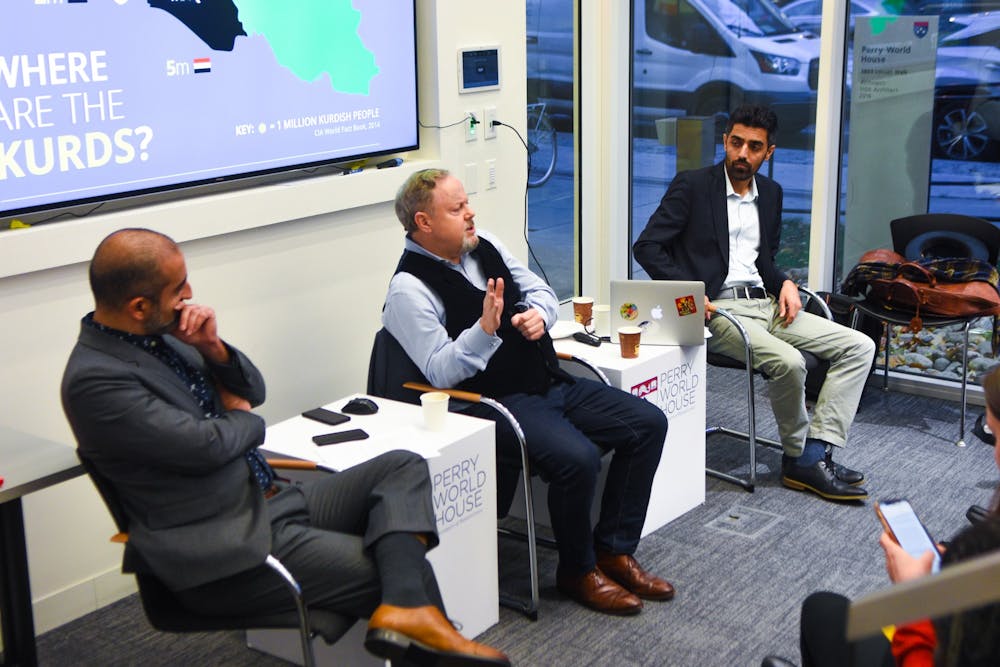Political science professor Brendan O’Leary and Perry World House Graduate Associate Mohammed Salih expressed concern about President Donald Trump’s recent decision to withdraw United States troops from northeastern Syria at a Tuesday night event.
The talk, titled “The World Today: Renegades or Realists? The U.S. in Syria,” was hosted at Perry World House. O’Leary, director of the Penn Program in Ethnic Conflict, offered insights into the consequences of the withdrawal along with Salih, a Kurdish journalist and doctoral student at Penn’s Annenberg School for Communication. The event was moderated by Middle East Center Associate Director John Ghazvinian.
During the lecture, O’Leary gave an overview of the power dynamics surrounding northeast Syria and the series of events that led to the current crisis. He criticized Trump’s decision to withdraw troops, which he described as “chaos tempered by chaos.”
U.S. troops have been stationed in Syria since 2015 when they were deployed by former President Barack Obama to combat the Islamic State. This October, President Trump abruptly ordered troops to withdraw from northeastern Syria, after previously considering a withdrawal in December 2018.

“The Kurds in Syria interpret this as calculated, deliberate, intentional, malevolent betrayal,” O’Leary said.
Following U.S. withdrawal, Turkish troops invaded the area, taking control from Kurdish soldiers who had fought alongside the United States against ISIS.
O'Leary said the presence of U.S. air force troops protected the Kurds residing in northeast Syria by deterring strikes from Turkish and Syrian air forces. When the United States pulled out of the region, the Kurds became vulnerable.
He added the withdrawal effectively enabled the Turkish army and its Syrian rebel allies to launch an offensive for the purpose of neutralizing security threats against Turkey. The BBC reported this displaced more than 176,000 people.
RELATED:
Perry World House hosts event on the history and future of U.N. peacekeeping missions
At Perry World House, Lord Mendelsohn highlights need for U.K. to reform after Brexit
“The Kurds in Syria interpret this as calculated, deliberate, intentional, malevolent betrayal,” O’Leary said.
Salih emphasized the intricate relationships between the nations involved in the conflict have made it more challenging to resolve. He said while the United States previously formed a strategic alliance with the Kurds for its battle against ISIS, it is also an ally of Turkey, a member of NATO with the second-largest army among the member nations.

During the lecture, O’Leary gave an overview of the power dynamics surrounding northeast Syria and the series of events that led to the current crisis.
Salih added that the Turkish government has framed its military action as a counter-terror operation against the People’s Protection Units, or YPG, a Syrian Kurdish militia that Turkey claims is connected to the Kurdistan Workers’ Party, or PKK.
The PKK has advocated for the autonomy of the Kurds living in Turkey since 1984 and has been marked as a terrorist group by both the United States and the European Union. While the YPG and PKK identify themselves as separate entities, the Turkish government has branded them both as adversarial organizations with similar ideologies that threaten Turkey’s national security.
Despite these challenges, Salih argued the Trump administration's troop withdrawal was poorly executed.
“The manner of how the pullout had been implemented was catastrophic," he said, adding that the United States could have helped empower the Kurds to negotiate an autonomy arrangement with the Syrian and Russian governments.









